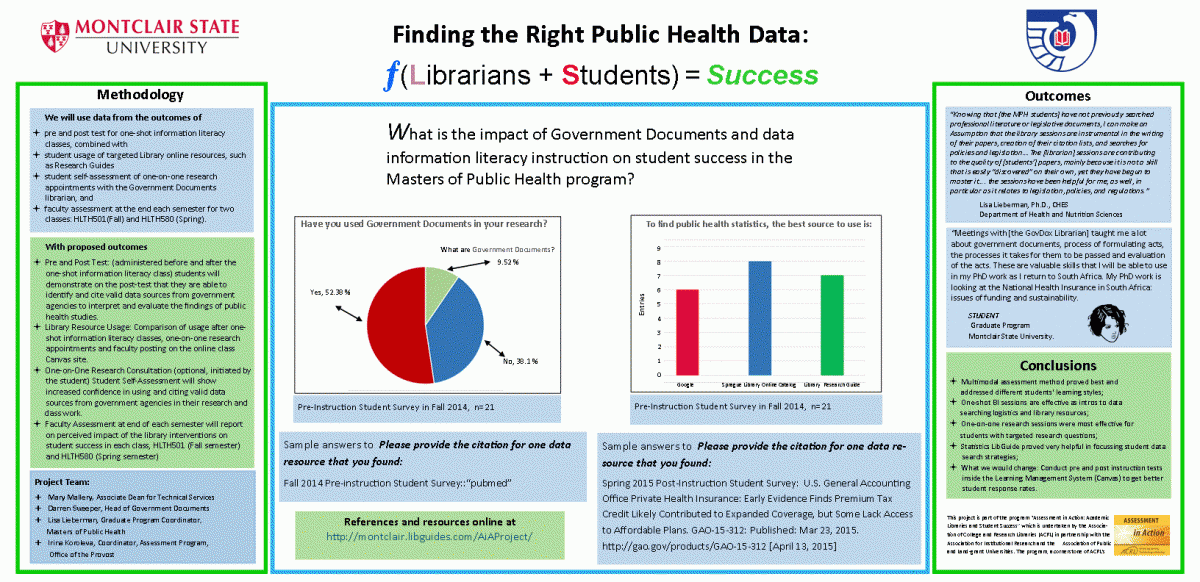By Darren Sweeper
“A popular Government, without popular information, or the means of acquiring it, is but a prologue to a Farce or Tragedy; or, perhaps both”.
James Madison
The old adage, “From the cradle to the grave” takes on greater significance when we consider the important role that E- Government and Data Information Literacy plays in the success of students. For students majoring in public health, knowledge of, access to and the ability to retrieve vital public health data is fundamental to the informational needs that will arise in their professional lives. What students learn or for that matter fail to learn, will have real world implications. For this reason it is important that librarians assess the learning outcomes of students. As library budgets remain flat and the need for public health information grows, freely available government information is being under-valued and under-utilized.
In an effort, to meet these challenges and informed by the ACRL Information Literacy Framework, The Harry A. Sprague Library, at Montclair State University applied for and was asked to participate as one of seventy libraries in the ACRL Assessment in Action program, beginning March, 2014 and culminating with a poster presentation of the results from our project at the American Library Association- Annual Conference June, 2015. The Assessment in Action (AiA) project is part of ACRL’s Value of Academic Libraries initiative. It is supported by the Association for Institutional Research (AIR), the Association of Public and Land-grant Universities (APUL), and the Institute of Museum and Library Services (IMLS). Our team sought to demonstrate the value of our library.
The AIA program was designed with the expressed purpose of assisting librarians in the development and implementation of an action learning project which examines the impact of the library on student success as well as contributing to the assessment activities on our campus. Our project was entitled, “Assessing the Impact of Government Documents and Data Information Literacy Instruction on Student Success for Students in the Master of Public Health program”. The project team was assembled to include representatives from the library, teaching faculty and university administration. The team consisted of Dr. Mary Mallery, Associate Dean for Technical Services, Darren Sweeper, Head of Government Documents and Data Librarian, Dr. Lisa Lieberman, Graduate Program Coordinator, Master of Public Health and Dr. Irina Koroleva, Coordinator, Assessment Program, Office of the Provost.
The project had three main goals. The first was to develop the professional competencies of librarians to document and communicate the value of the library to institution’s goals for student learning and success. The second goal was to build and strengthen collaborative relationships with university stakeholders around the issue of library value. Lastly the third goal was to contribute to the university assessment work by creating approaches, strategies’ and practices that document the contribution of the library to the overall goals and missions of the university. Our overarching goal was to help students meet the Core Competencies for the Master of Public Health, Concentration in Community Health Education program. Our team used a multi-modal assessment process; including measuring the outcomes of one-shot information literacy classes in government documents and data information literacy combined with embedded online research guides and individual research appointments with the government documents librarian. Three outcomes emerged from our project. We learned that multi-model assessment methods are the most effective means to address different learning styles, that one-shot information sessions are effective as introductions to basic searching and data retrieval. Those individual research consultations are effective when students have targeted research questions. Additionally, we discovered that research libguides help students focus on their search strategies.
As previously mentioned one of our project goals was to build and strengthen the collaborative relationships with university stakeholders and to make a contribution to the overall goals and mission of the university by demonstrating the value of the library. We sought to contribute to the university assessment work by designing an instructional curriculum, which was useful for students in the future, and included developing search strategies and documenting best practices that help students become better researchers.
The AiA initiative’s stated aim is to further academic libraries’ efforts to participate in higher education discussions of accountability by teaching librarians how to demonstrate their roles in student learning and success. Our project makes a significant contribution in this regard. It demonstrated the value of librarians, libraries and their collections and helped us to lay the ground work for creating a culture of assessment within our organization, one in which we recognize the importance of assessment as a way to demonstrate the library’s value to the university. Our project not only helped our students develop critical competencies that they will need and use in their future professional work, but also helped promote the idea of using government information and data in the process of life-long learning. Our project shows that Data Information Literacy is a valuable concept, and assessing its impact on learning outcomes and student success can produce measurable and important results.
As the amount of electronic information and data continues to grow, so has the specialized field of Data Information Literacy. The importance of E-Government, Data Information Literacy and life-long learning cannot be overstated. We live in a world where opportunities for learning are ubiquitous and communal. Freely available and easily accessible health data is needed now more than ever. The Montclair State University AiA project, confirmed this fact for our team. Assessing the learning outcomes of our students is important and valuable.
In closing we hope that our project will inspire others to apply to the AiA program next year, as well as help to create and foster a culture of assessment in their libraries. Students instructed in the use of E-Government and Data Information Literacy will be better prepared to engage in an E-learning environment and more importantly, guide them to becoming more engaged and better informed citizens. E-Government and Data Information Literacy is vital to the field of Library and Information Science and librarians of all backgrounds must possess the skills needed to instruct students in its use. We Are All Data Librarians Now!
 Darren Sweeper is the Head, Government Documents and Data Librarian at Montclair State University. He can be reached at sweeperd@mail.montclair.edu
Darren Sweeper is the Head, Government Documents and Data Librarian at Montclair State University. He can be reached at sweeperd@mail.montclair.edu

